- Home
- Mary Downing Hahn
A Haunting Collection Page 14
A Haunting Collection Read online
Page 14
Emma smiled and took her mother’s hand. We walked along the boardwalk to a little restaurant with a deck built out over the lake and seated ourselves at a table shaded by a green umbrella. Dulcie and I ordered lobster rolls and iced tea, but Emma asked for chocolate milk and a hamburger. Just plain, she said, no lettuce, no tomato, no pickle. But with French fries and lots of ketchup.
The waitress—a college girl, I guessed—smiled at Emma. “I love a kid who knows exactly what she wants.”
While we waited for our food, Dulcie gave Emma a few slices of bread from a basket on the table. “Why don’t you go feed the gulls?”
Emma ran to the railing and began tossing bits of bread into the air. In seconds, she was surrounded by dozens of hungry gulls, screaming for their share.
Dulcie turned to me. “I told Mr. Goldsmith the whole story,” she began, “leaving out Sissy, of course. He said it’s pointless to go to the police now. The case was closed years ago. Accidental drowning.” She took a sip of water. “He told me Claire and I weren’t—aren’t—responsible for Teresa’s death. Even if we’d told the truth the day it happened, it wouldn’t have changed anything.”
“What does he think you should do?”
“Forget about it.” She gave me a bitter smile. “If only it were that easy.”
I thought of Sissy begging me to make Dulcie tell the truth, to take some of the blame for what happened. “But you can’t just forget about it, you have to tell—”
Dulcie laid her hand on mine. “I know, Ali. Believe me, I know.” She turned her head to watch Emma hurl the last of the bread to the gulls. “I’m going to talk to someone at The Sentinel after lunch. It’s the kind of story newspapers love.” Her hand tightened on mine. “Will your mother be upset?”
“I think she’ll be okay with it,” I said, hoping I was right.
“Here you are.” The waitress set our food on the table, and Emma came running.
“Did you see me feeding the gulls?” she asked the girl.
“I sure did. You must have fed the entire population.”
“They’re big,” Emma said, “and they have sharp beaks and mean yellow eyes, but I wasn’t scared.”
“I bet nothing scares you.” The waitress stood with her empty tray pressed to her chest, smiling down at Emma.
“Sometimes nothing is the scariest thing of all,” Emma said in a low voice, but the waitress had already turned her attention to a family at another table. No one heard her but me.
After we’d eaten, Dulcie told us she had one more thing to do before we went home. “How about you and Ali waiting for me at the arcade?” she asked Emma. “You can ride the carousel, the Ferris wheel, the bumper cars—anything but the Tilt-A-Whirl. You’ll throw up for sure on that one.”
Emma clapped her hands with pleasure, too excited to notice that Dulcie had eaten less than half of her lobster roll. She’d barely touched her French fries. And she hadn’t even bothered to taste the coffee she’d ordered instead of dessert. I watched her walk away, head down, shoulders slumped. If I hadn’t known she was doing the right thing, I would have run after her and stopped her.
In a hurry to get to the carousel at the end of the boardwalk, Emma ran ahead, towing me along behind her. Soon she was perched on a fancy white horse wearing a garland of carved flowers, and I was beside her on a black horse. We went up and down and round and round, accompanied by old-fashioned organ music. I smelled popcorn and cotton candy and suntan oil.
Emma seemed as happy as the other children. She laughed and waved to everyone, and they waved back. It amazed me that her mood could change so quickly. Here I was, worrying about Dulcie, brooding about Sissy, wanting my mother, and there Emma was, the princess of the carousel.
By the time Dulcie came back, we’d ridden the carousel five times, the Ferris wheel once, and the bumper cars twice. We’d also eaten cotton candy and shared a box of popcorn. We were ready to go home.
At the car, Dulcie fumbled with the buckle on Emma’s safety belt. “Sit still,” she said, her voice sharp. “How do you expect me to do this with you wiggling like that?”
Emma frowned. “I’m not wiggling.”
“There.” Dulcie snapped the buckle, slammed the back door, and got into the front seat beside me.
With a jerk, she pulled away from the curb and headed into the afternoon traffic. “I hate tourists,” she muttered. “Why do they have to come here and ruin everything? Crowds, trash everywhere. It’s a disgrace.”
Her change of mood told me things hadn’t gone well at The Sentinel.
Not long after we got home, Emma fell sound asleep on the couch, worn out from all the excitement. Afternoon sunlight washed the walls with pale yellow, and a calm stillness filled the house.
I joined Dulcie on the deck. “They’re running the story next week,” she said. “A photographer’s coming on Sunday to shoot some pictures. They want to talk to the police as well, and some of the other people who remember Teresa and her family.”
Getting to her feet, she walked to the railing and stared at the lake. “The way they acted, you’d think I just confessed to murder. I should have gone back to New York and never said a thing about this. Or never come here at all. What was I thinking anyway?”
“Are you going to call Mom?” I asked. “And tell her?”
Dulcie looked over her shoulder at me. “Do you think I should?”
“She might want to come.”
“Yes, I guess she might.” Dulcie went to the door.
I followed her inside. “Can I talk to her, too?”
“Of course.” Dulcie picked up the receiver and dialed our number. I heard Mom answer. In a low voice, Dulcie told her what she’d done. “I thought you’d want to be here. If we get this out in the open, maybe we can put it behind us.”
From where I stood, next to Dulcie, I heard Mom crying into the phone. “Yes,” she sobbed. “Yes, I’ll come. Pete and I can drive up Saturday.”
“Thanks, Claire. . . . Ali wants to talk to you.” Dulcie handed me the receiver.
“Are you okay?” Mom asked. The worry in her voice surged through the line.
“Yes, I’m fine.”
“Dulcie shouldn’t have told you.”
“She had to tell the truth,” I said.
In the silence before Mom spoke, I heard a familiar whisper. “Tell her about me. Let her know I’m still here. Just like she thought.”
Sissy stood a few feet away where the shadows were darkest, holding the doll and frowning. “If you don’t tell her, I will.” With that, she vanished without a sound, unseen and unheard by anyone but me.
“Did you say something?” Mom asked.
“No,” I stammered. “It’s just Emma, playing with her paper dolls.”
“I thought I heard . . .” For a moment or two, Mom breathed slowly into the phone as if she were trying to calm herself. At last she said, “Do you hate Dulcie and me for leaving Teresa to drown?”
The question took me by surprise. “Of course not, Mom. You tried to find her, you—”
She broke in. “Maybe if we’d tried harder, we could have saved her. If we’d told someone right away. If we’d—” She started crying. “I go over it again and again. I can’t stop thinking about Teresa, about leaving her there—it’s haunted me my whole life.”
“It wasn’t your fault. You were just a little kid, you didn’t throw the doll, you—”
Dulcie had crossed the room and now snatched the phone from my hand. “Stop it, Claire,” she said to my mother. “What happened, happened. Nothing can change that. You’ll just have to deal with it.”
I reached for the phone, but Dulcie shook her head. “Go see what Emma’s doing. I’ll say goodbye to your mother for you.”
I retreated to the living room and tried to listen to Dulcie’s end of the conversation. It sounded as if she was bullying Mom, talking tough, acting the part of big sister. Silently, I egged Mom on. Stand up for yourself, stop crying, tell her you’re
an adult, too. By the time Dulcie hung up, I was beginning to wonder if I’d ever look up to my aunt the way I used to.
Fearing she’d know I’d been eavesdropping, I sat down quickly on the sofa next to Emma. She woke up just as Dulcie entered the room, clutching a cup of coffee—her fifth, sixth? It was hard to keep count. Her blood must’ve been pure caffeine.
She stood by the window, looking out at the lake, ignoring both of us. Her back was tense, rigid almost. “Is your mother still seeing a shrink?” she asked.
“She’s depressed,” I said. “She tries not to be, but—”
Dulcie spun around and faced me. “Don’t tell me about depression. She needs something to do besides moon over her flowers. She used to write poetry, she used to draw. Now she just sits around feeling sorry for herself.”
“It wouldn’t kill you to be nicer to her.” Fed up with Dulcie, I left the house. Ignoring Emma’s call to wait for her, I ran down the steps to the lake. I needed some time alone. No Emma, no Dulcie, no Sissy—especially no Sissy. If I saw her, I’d run.
I walked all the way back to Webster’s Cove and treated myself to ice cream. But I was still in a bad mood when I returned. Worse in a way, because I was now tired and hot.
Somehow I got through dinner without making a scene and managed to read to Emma before bedtime. Dulcie had nothing much to say—which was fine with me. An apology was all I wanted to hear from her, but I had a feeling that was not going to happen. While I read to Emma, my aunt sat in one of the old armchairs, drinking yet another cup of coffee. She’d pulled her hair up into an untidy topknot, and her hands and arms were streaked with the same black paint that spattered her jeans and T-shirt.
Sitting around feeling sorry for yourself. Isn’t that what you accused Mom of doing? I thought.
“Bedtime.” Dulcie roused herself to pick up Emma.
“I want to hear another chapter!”
“I’m tired, and so are you, and so is Ali. It’s time we all went to bed.”
Without another word, not even “Good night,” Dulcie carried Emma off to bed. I guessed that meant she was just as mad with me as I was with her.
When I went up to my room, I found Sissy perched on my bed, holding Edith on her lap. I wasn’t surprised to see her. It was obvious she wasn’t done with us.
“Did Dulcie tell the truth at last?” she asked.
“She talked to her lawyer. He said she hadn’t committed a crime. And then he told her she should forget the whole thing.”
Sissy sneered. “She’s been doing a pretty good job of that all along.”
I bristled. “Dulcie’s never forgotten a single detail of that day. Neither has Mom. In fact, Mom feels worse than Dulcie. In a way, it’s ruined her whole life.”
“How about me? Don’t you think they ruined my life?” Sissy asked plaintively. “Believe me, I feel a whole lot worse than either of them!”
“I’m sorry,” I said. “It was stupid of me to say that.”
“Yes, it was,” Sissy agreed, clearly pleased I’d apologized.
“After she saw her lawyer,” I went on, “Dulcie talked to a reporter at The Sentinel. A photographer’s coming here to take pictures, and they’re going to interview lots of people, including Dulcie and my mother.”
Sissy smiled a real smile for once. “That’s just exactly what I wanted. Everybody in Webster’s Cove will know the truth at last.”
She watched me get ready for bed, and then crawled in beside me. Shivering, I moved toward the wall, giving her as much room as I could.
“Just a few more nights,” she whispered, “and then you’ll never see me again.”
Once I would’ve been happy to hear that, but tonight I felt an unexpected twinge of sadness. Odd as it sounds, I was getting used to having Sissy around. Now that I knew so much more about her, it was easier to put up with her sadness and anger.
20
In the morning, Sissy was gone, but her pillow was damp and cold.
Dulcie met me at the foot of the steps. She’d tidied her hair, washed off the paint, and changed her clothes, but she was still tense and edgy. Behind her, I could see Emma sitting at the kitchen table, coloring a picture.
I looked at my aunt warily, braced for another outburst.
Glancing at Emma, she spoke in a low voice, “I’m sorry for my behavior yesterday. I was upset. And Claire just fell apart. I needed her to be strong, so I could be strong.” She reached out to hug me, and I felt myself begin to relax.
“I never should have criticized your mother,” Dulcie said. “She can’t help being depressed. I know she’s trying to get better. Please forgive me, Ali. I love you both, your mother and you. We’re all the family we have.”
I returned her hug. “It’s okay, I understand.” That is, I think I do.
Dulcie let me go and gazed at me thoughtfully. “Did you tell your mother about Teresa?”
“You mean, Sissy? No,” I said. “But even if we don’t say a word, Sissy will figure out a way to let her know.”
“You really saw her?” Dulcie whispered. “It wasn’t a kid playing a trick?”
“It was her,” I said. “Teresa . . . Sissy . . . whatever you want to call her. She’s been hanging around all summer.”
Dulcie shook her head. “I’m sorry, Ali, but that’s hard to believe, especially on a sunny day like this.”
A little later, I heard a car. Although it was way too early to be Mom and Dad, I ran to the door.
Ms. Trent got out of her faded blue Volvo and waved to me. “I was driving past, and I thought I’d drop in. Is your aunt here?”
I beckoned her to follow me inside. “Ms. Trent’s come to see you,” I told Dulcie.
She looked up from the newspaper and made an effort to smile. “I just made a fresh pot of coffee. Would you like a cup?”
“I never turn one down.” Ms. Trent followed Dulcie to the kitchen. I heard her say something in a low voice.
Dulcie turned to me. “Weren’t you going to make paper dolls for Emma?”
“Yes, yes, you promised!” Emma grabbed my hand and towed me out to the deck. She’d left paper, crayons, and scissors scattered across the picnic table. “Make one like you and one like me and one like—” She stopped. “No, just make two. You and me. Best friends.”
Emma watched me draw, her face so close I could feel her warm breath on my hand. While she chattered on about the clothes she wanted for her doll, I strained to hear Dulcie and Ms. Trent’s conversation. I picked up a word here, a word there, enough to know they were talking about Teresa. Or Sissy. Whichever she preferred to be called.
Emma jumped up suddenly. “There’s a cat. It’s after a bird!”
A big black and white cat was creeping across the grass, belly to the ground, eyes on a sparrow that was pecking at seeds spilled from the bird feeder.
When Emma ran across the lawn to stop it, I moved closer to the kitchen window, hoping to hear better.
“Nothing’s a secret in Webster’s Cove,” Ms. Trent was saying. “Ed Jones, the reporter you talked to, has a wife with a big mouth. She called Jeanine Donaldson and told her the whole story. Jeanine didn’t waste a second spreading the news. By the time she told me, the whole town knew, including Teresa’s sister, who lives a few miles away in Lakeport—which was news to me.”
“Ali, come help me!” I turned to see Emma holding the small brown bird in her hands. “It’s still alive.”
While the cat watched from the bushes, I ran to Emma’s side. The sparrow flapped its wings feebly. Its yellow beak opened and closed slowly. While I watched, its eyes lost their luster, and it stopped moving.
“Can we save it?” Emma asked.
I took the sparrow from her as gently as I could. “The poor little thing,” I whispered. “It’s dead.”
Emma began to cry. “I hate cats. I hate them!”
The old stray lurked under the bush, twitching its tail. It was clear it felt no remorse. Given the opportunity, the cat would have sna
tched the bird and run off with it.
Emma bent down to pick up a stone. Before she could throw it, I grabbed her arm. “No,” I said. “Cats can’t help killing things. It’s their nature.”
Emma dropped the stone and touched the bird’s body sadly. “Can we bury it?”
I went inside to find a large spoon to dig a grave, and Emma followed me, still crying for the bird. “Why do things have to die?” she cried, burrowing into her mother’s arms. “It’s not fair.”
I showed the dead sparrow to Dulcie and Ms. Trent. “A cat killed it. We’re going to bury it.”
“Do birds have ghosts?” Emma asked Dulcie.
Over Emma’s head, Dulcie and Ms. Trent glanced at each other. Ms. Trent shook her head, and Dulcie said, “Of course not, darling. There’s no—”
Emma straightened up and looked Dulcie in the eye. “Don’t say there’s no such thing. Ghosts are real. You know it, and I know it, and Ali knows it.” She hesitated a second. “And Sissy knows it.”
Emma stood there gazing at her mother, daring her to argue.
“We came in to get a spoon,” I told Dulcie, “so we can dig a grave for the bird.”
While Dulcie selected an appropriate spoon, I ran to my room for a tissue box I’d thrown in the trash that morning. We wrapped the bird in an old handkerchief and laid it in the box. Then Emma and I took turns digging a hole under a lilac bush, and gently placed the box in the ground.
While we said a few words over the bird, I felt my neck prickle, as if someone was watching us. Uneasily, I glanced over my shoulder. Almost hidden in the shade of a tall oak, Sissy peered at me. When she realized I’d seen her, she ducked out of sight.
I returned my attention to the pile of earth heaped beside the small grave and spooned some onto the box. Emma followed my example. With Dulcie and Ms. Trent helping, we filled the hole and tamped it down firmly to keep the cat from digging up its victim.
Before we returned to the house, I looked at the oak tree. Sissy was gone.
Dulcie filled two coffee mugs for herself and Ms. Trent and poured lemonade for Emma and me. While my aunt and Ms. Trent sat at the table, they chatted quietly about quilting and painting. Ms. Trent said a small gallery had just opened on the main road. Dulcie asked about an arts and crafts shop she’d noticed on a side street. They both deplored the crowded roads and beach. It was comforting to hear them talk about ordinary things.

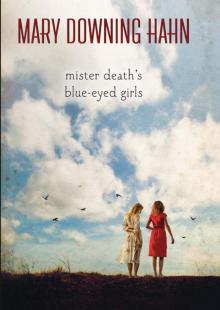 Mister Death's Blue-Eyed Girls
Mister Death's Blue-Eyed Girls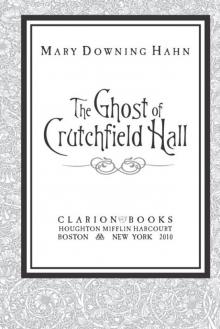 The Ghost of Crutchfield Hall
The Ghost of Crutchfield Hall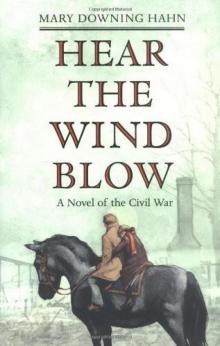 Hear the Wind Blow
Hear the Wind Blow Time of the Witch
Time of the Witch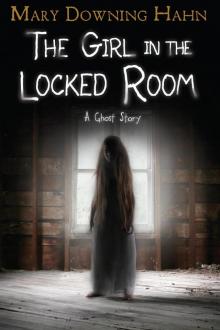 The Girl in the Locked Room: A Ghost Story
The Girl in the Locked Room: A Ghost Story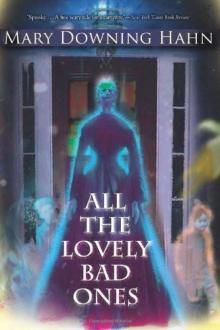 All the Lovely Bad Ones
All the Lovely Bad Ones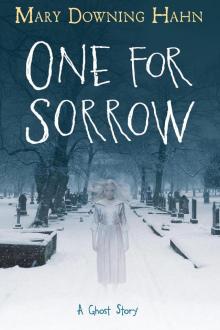 One for Sorrow
One for Sorrow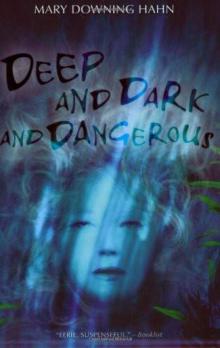 Deep and Dark and Dangerous
Deep and Dark and Dangerous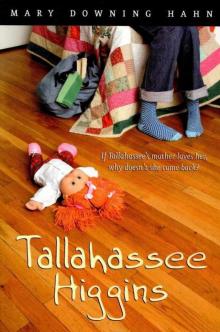 Tallahassee Higgins
Tallahassee Higgins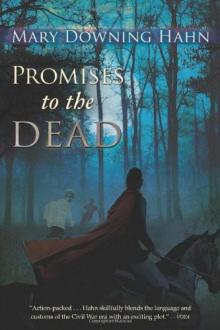 Promises to the Dead
Promises to the Dead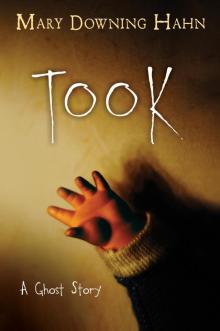 Took: A Ghost Story
Took: A Ghost Story Following My Own Footsteps
Following My Own Footsteps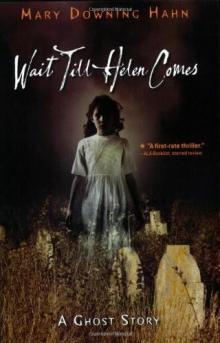 Wait Till Helen Comes: A Ghost Story
Wait Till Helen Comes: A Ghost Story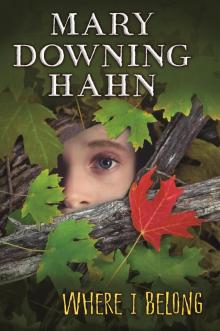 Where I Belong
Where I Belong The Spanish Kidnapping Disaster
The Spanish Kidnapping Disaster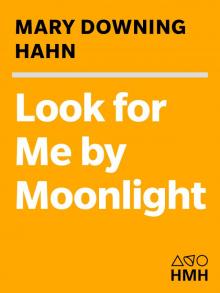 Look for Me by Moonlight
Look for Me by Moonlight The Old Willis Place
The Old Willis Place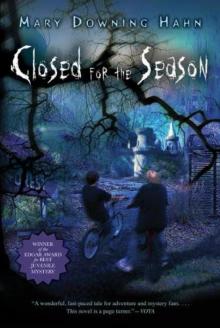 Closed for the Season
Closed for the Season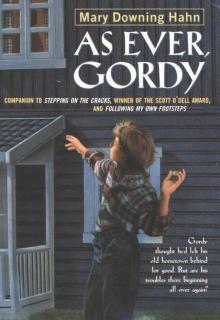 As Ever, Gordy
As Ever, Gordy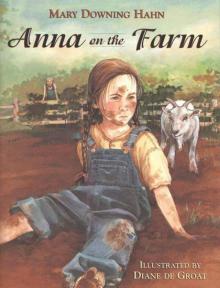 Anna on the Farm
Anna on the Farm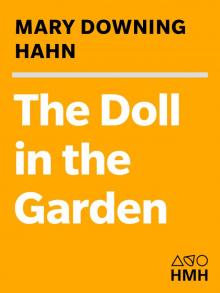 The Doll in the Garden
The Doll in the Garden Daphne's Book
Daphne's Book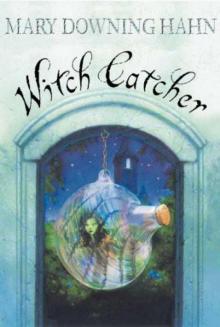 Witch Catcher
Witch Catcher The Gentleman Outlaw and Me--Eli
The Gentleman Outlaw and Me--Eli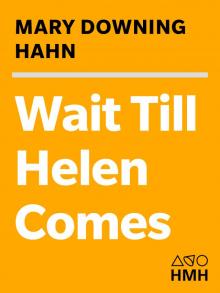 Wait Till Helen Comes
Wait Till Helen Comes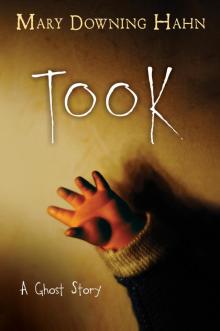 Took
Took A Haunting Collection
A Haunting Collection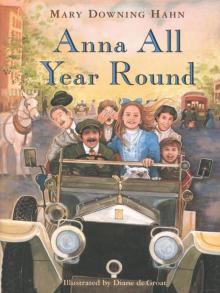 Anna All Year Round
Anna All Year Round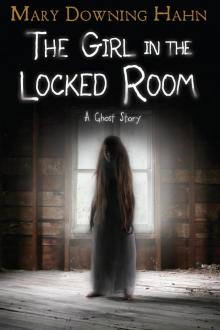 The Girl in the Locked Room
The Girl in the Locked Room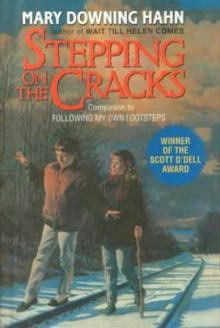 Stepping on the Cracks
Stepping on the Cracks